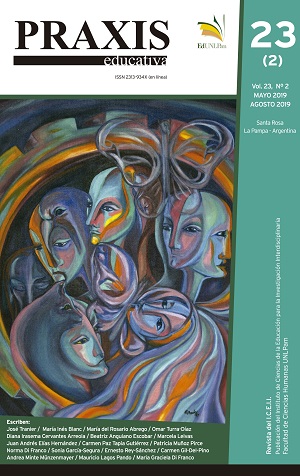Dissonances of Existence and the living well: about the neoliberal advance and the new challenges of the new agenda in Contemporary Pedagogy
DOI:
https://doi.org/10.19137/https://dx.doi.org/10.19137/praxiseducativa-2019-230202Keywords:
neoliberalism, dissonances, existence, living well, pedagogyAbstract
This article discusses the advance of neoliberalism, understood as the political imposition of a certain global pattern of power that constantly requires that the “dominated and defeated gazes” of those groups that suffer the effects of exclusion, naturalize and even justify these impositions and policies as well. That is why we will address the concept of dissonances of Existence to describe the ways of social anguish generated by this political rationality. In this regard we will start with a sort of genealogical analysis relative to these forms of cultural, social and emotional diaspora, that threaten the “Good Living” (or Living Well) of our peoples. Planning hope from a located pedagogy, understood as a cultural policy that gives voice to the voiceless ones, will constitute the main aim for the new agenda of contemporary pedagogy.Downloads
References
Apple, M. (2013), Can education change society? New York: Routledge.
Arendt, H. (2012), La condición Humana, Buenos Aires: Paidós.
Augé, M. (2000). Los no lugares. Espacios del anonimato, Una antropología de la sobremodernidad, Barcelona: Gedisa.
Baremboin, D. SAID, Edward, (2002) Paralelismos y paradojas, Reflexiones sobre música y sociedad, Buenos Aires: Debate.
Disonancias del existir y del buen vivir: acerca del avance neoliberal y los desafíos de la nueva agenda en la pedagogía contemporánea
José Tranier
Praxis educativa UNLPam, Vol. 23, N° 2, mayo – agosto 2019, ISSN 2313-9334X, pp. 1 – 24. 20
De Las Casas, B. (2011), Brevísima relación de la destrucción de las Indias, Medellín: Editorial Universidad de Antioquia.
Bauman, Z. (2005), Globalización, consecuencias humanas, México: FEC.
Boaventura de Sousa, S. (2006), Renovar la teoría crítica y reinventar la emancipación social, Buenos Aires: CLACSO.
Bordelois, I. (2003), La palabra amenazada, Buenos Aires: El Zorzal.
Cullen, C. (2017), Reflexiones desde nuestra América, Buenos Aires: Las cuarenta.
Dussel, E. (2007), Política de la liberación, Historia mundial y crítica, Volumen I, Madrid: Trotta.
Dussel, E.(2009), Política de la liberación, Arquitectónica, Volumen II, Madrid: Trotta.
Fanon, F. (2009), Piel negra, máscaras blancas, Madrid: Akal.
Foucault, M. (2009), El gobierno de sí mismo y de los otros, Buenos Aires: FEC.
Freire, P. (2008), Pedagogía del Oprimido, Buenos Aires: Siglo XXI. 15. Freud, S. (1992), “Una dificultad del Psicoanálisis”, en Sigmund Freud, Obras completas, De la Historia de una neurosis infantil y otras obras, Buenos Aires: Amorrortu. Vol. XVII, pp. 125-137.
Gadamer, H. (1960), Verdad y método, Salamanca: Sígueme.
Guaman Poma de Ayala, F. 1987, Nueva crónica y buen gobierno, México: Siglo XXI.
Holloway, J. (2010), Crack Capitalism, New York: Pluto Press.
Houtart, F. (2009), Deslegitimar el Capitalismo, Reconstruir la esperanza, Buenos Aires: CLACSO.
Kusch, R. (2007), Obras Completas, Rosario: Fundación Ross.
Lander, E. (2000), (Compilador). La colonialidad del saber: eurocentrismo y ciencias sociales: perspectivas latinoamericanas. Buenos Aires: CLACSO.
Levi, P. (2011), Trilogía de Auschwitz, Barcelona: El Aleph. 23. Mignolo, W. (2007), La idea de América Latina, Barcelona: Gedisa.
Porta, L. Yedaide, M. (Compiladores), (2017), Pedagogía (s) Vital (es), Cartografías del pensamiento y gestos ético-políticos en perspectiva descolonial, Mar del Plata: Eudem. 25. Quijano, A. (2000): “Colonialidad del Poder, Eurocentrismo y América Latina”, en Lander E. (Comp.) La Colonialidad del Saber, Eurocentrismo y ciencias sociales. Perspectivas latinoamericanas. CLACSO: Buenos Aires, pp. 201-246.
Walsh, C. (2005), Pedagogías decoloniales, Prácticas insurgentes de resistir, (re) existir y (re) vivir. Tomo I, Ecuador: Serie Pensamiento Decolonial.
Fuentes Cinematográficas
Rossignon C. (Productor) y C. Carrion (Dirección). (2005). Feliz Navidad. Francia: Fox Distribución.
-Nozik, M., E Tenembaum y K. Tenkhoff. (Productores) y W. Salles (Dirección). (2004). Diarios de Motocicleta. Argentina: Buena Vista Internacional Distribución.
Downloads
Published
Issue
Section
License
Copyright Notice
Editorial Committee Educational Praxis Magazine:
I hereby declare that I am the author of the article titled (article name), that it is original and my own and that it was not previously published in any other format or medium. I declare to know that the magazine will not charge me any type of fee under any circumstances, nor will I receive any type of monetary compensation If it were accepted for publication in Educational Praxis, I authorize the aforementioned magazine to publish it digitally and to advertise it on its social networks.
If the work is published, I adhere to the Creative Commons license called "Attribution - Non-Commercial Share Alike CC BY-NC-SA", through which it is allowed to copy, reproduce, distribute, publicly communicate the work and generate derivative works, as long as when the original author is cited and acknowledged. This license has been used since September 2018. In 2016 CC BY NC ND 4.0 was adhered to; and in the years 2017 and 2018 (January-August) CC BY NC 4.0.
This CC BY-NC-SA Share Alike license does not, however, permit commercial use of the work. As an author, the journal may establish additional agreements for the non-exclusive distribution of the version of the work published in the journal, it allows me to self-archive the published articles, in their post-print version, in institutional, thematic repositories, personal web pages or any other relevant use. with the recognition of having been first published in this journal.
Educational Praxis adheres to DORA (Declaration on Research Assessment) signed in San Francisco, California, on December 16, 2012, and to the Declaration of Mexico (Joint Declaration LATINDEX - REDALYC - CLACSO - IBICT).















_(1)2.png)


3.png)











_(2).png)






2.jpg)









